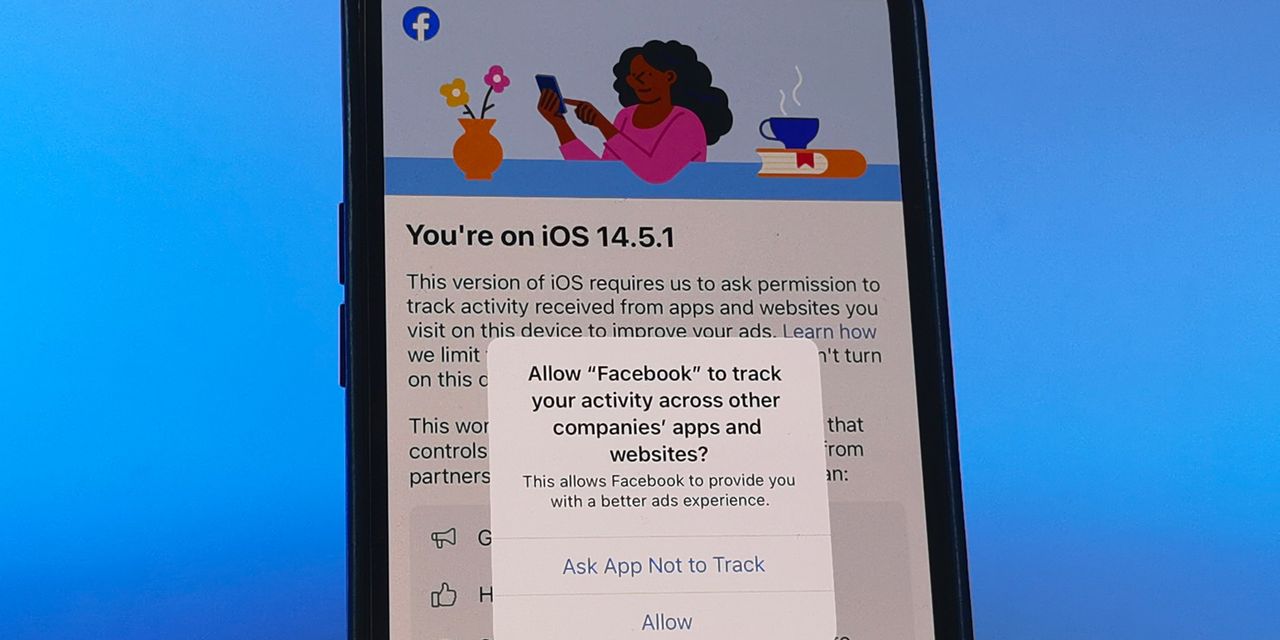Second-quarter results coming up in a few weeks from ad giants
FB -0.01%
and Google parent Alphabet could suggest the bark of
Apple’s
AAPL 0.82%
iOS privacy changes was worse than their bite. But investors shouldn’t get too comfortable: The bulk of the impact is likely still to come.
In April, Apple released an updated version of its operating system, which now requires apps to ask for users’ permission to track their activities once they leave the apps. For ad platforms, off-app tracking has historically helped to show advertisers an enhanced return on their investment. Most users don’t immediately buy a product when they see an ad for the first time on a platform; many take weeks, viewing multiple iterations of an ad, to finally convert. When they do buy, they often do it directly via a brand’s website.
Though Apple’s new operating system will have been around for the bulk of the second quarter, its early effects on ad giants might look muted for several reasons. First, last year’s second quarter saw the heaviest effects of the pandemic as many advertisers temporarily pulled funds amid global uncertainty. Facebook and Google boosted sales an average of just over 4% year-over-year in that period of 2020, making for a favorable comparison this year.
Second, adoption of Apple’s latest operating system is still very much under way. By the end of June, around half of Apple smartphones and tablets globally had yet to update to one of the two latest iOS 14 versions, which both include the ad-tracking limitations, according to Statcounter.
Third, it seems many advertisers have pre-emptively shifted their budgets to focus more on targeting Android, rather than iPhone users. From early February to early May, the mix of global ad spending on Android rose from roughly 60% to over 68%, according to marketing analytics firm Singular. Moves to target users with more lenient privacy policies may be helping ad platforms to recoup lost revenue from users who opted out of ad targeting on iPhones, analysts say.
But we are still in early innings. Apple users tend to update their devices quickly. According to Statcounter, more than 82% are on some version of iOS 14, which was released to the general public in September. By contrast, less than 18% of Android users have updated to Android 11, which was released the same month. About 42% of iOS users have already taken up the latest iOS 14 update that was released less than two months ago, strongly suggesting that by the end of the year, most iPhone users will be on an operating system allowing them to easily opt out of ad tracking.
That is bad news for ad platforms, given most users seem to be taking up the opportunity to restrict their monitoring. Globally, less than 20% of iPhone users actively give apps permission to track them, data from Singular show, and that percentage could worsen. Younger, tech-savvy users may have been some of the first to adopt updates, but a recent survey from F5 Labs shows users tend to get even more privacy conscious as they age, suggesting later adopters could be even less likely to allow ad tracking.
Even if advertisers continue to deploy more of their budgets toward Android, ad platforms could still feel the burn. While 73% of people world-wide use Android phones, according to Statcounter, more than half of North America uses an iPhone. North America is still the largest ad market for both Facebook and Google, and iPhone users have long been known to be a more lucrative segment. In its recent lawsuit against Apple, Epic Games said iOS users spend approximately double what Android users spend on in-game transactions for its mega-popular “Fortnite.”
AB Bernstein’s Mark Shmulik likens the iOS impact over the next few quarters to a “multicar pileup on the highway,” calling the Android shift a necessary detour advertisers must take, albeit a less desirable route.
Apple’s changes won’t seriously hurt ad giants, especially over the long term. Facebook has nearly half the world’s population using one of its apps, giving it a massive first-party data trove of its own that it will be able to continue to draw upon so long as users continue to log on. And Google’s ownership of both Android and the Ad Mob mobile advertising platform gives it important offsets.
Still, Wall Street could be underestimating the negative near-term effects, especially if big second-quarter growth rates engender a false sense of security. Analysts are forecasting Facebook will increase its revenue a quarterly average of 25% in the back-half of this year—less than 2 percentage points shy of what the company put up over the same period in the prior two years. Google’s full-year ad revenue is expected to jump 29%, its best growth rate in a decade.
Technology’s savviest navigators will inevitably find their way around Apple’s roadblock—it just may take them longer than anticipated.
Write to Laura Forman at laura.forman@wsj.com and Dan Gallagher at dan.gallagher@wsj.com
Copyright ©2020 Dow Jones & Company, Inc. All Rights Reserved. 87990cbe856818d5eddac44c7b1cdeb8













































